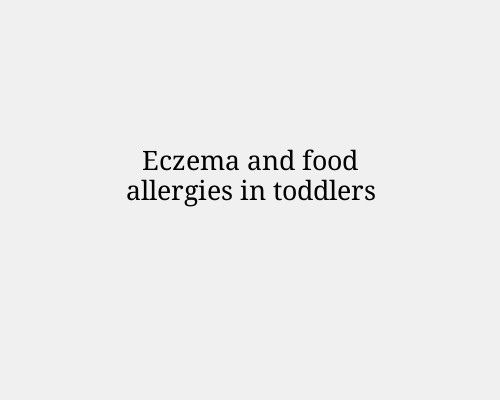
Eczema and food allergies in toddlers are closely connected, but they’re not always the same thing. Many parents assume that eczema (atopic dermatitis) is directly caused by food, but the relationship is more complicated. Here’s what you should know:
Understanding eczema in toddlers
Chronic skin condition: Eczema causes dry, itchy, inflamed skin. It usually starts in infancy or early childhood.
Immune-related: Toddlers with eczema often have an overactive immune system that reacts strongly to irritants and allergens.
Genetic factor: A family history of allergies, asthma, or eczema increases risk.
The link between eczema and food allergies
Higher risk: Children with moderate to severe eczema are more likely to develop food allergies.
Not always food-related: In most toddlers, eczema flare-ups are triggered by things like dry air, heat, soap, detergents, or infection—not food.
Food allergy connection: About 30–40% of children with moderate to severe eczema may also have a food allergy (commonly to cow’s milk, egg, peanuts, wheat, or soy).
Skin barrier issue: Eczema damages the skin barrier, making it easier for allergens to “sensitize” the immune system, which can lead to food allergies later on.
Signs food might be triggering eczema
Eczema flare-ups that worsen consistently after eating a certain food.
Immediate reactions (hives, swelling, vomiting, wheezing) within minutes to 2 hours of eating.
Ongoing, stubborn eczema that doesn’t respond to standard treatment and flares even with good skincare.
Important: Not every eczema flare is food-related. Random elimination diets can cause nutrition problems in toddlers. Always consult a paediatrician or allergist before removing foods.
Diagnosing food allergies in toddlers with eczema
History & observation: Doctors will check patterns between foods and symptoms.
Skin prick test or blood test: These can help detect sensitization but don’t confirm an allergy alone.
Oral food challenge: The gold standard, done under medical supervision, to confirm if a food truly triggers a reaction.
Managing eczema and food allergies
Daily eczema care
Use fragrance-free moisturizers multiple times a day.
Short, lukewarm baths followed by moisturizer ("soak and seal" method).
Avoid scented soaps, bubble baths, and harsh detergents.
Dress toddler in cotton clothing, avoid wool.
Medical treatment
Paediatricians may prescribe topical steroids or non-steroid creams for flare-ups.
Antihistamines can sometimes help with itching.
Allergy management (if diagnosed)
Strict avoidance of the confirmed allergen.
Emergency plan with an epinephrine auto-injector if the allergy is severe.
Nutrition guidance to make sure the child doesn’t miss key nutrients when avoiding certain foods.
Key Takeaways
Most toddler eczema is not directly caused by food, but children with eczema are more likely to have food allergies.
Do not start eliminating foods on your own—this can make eczema worse and cause growth issues.
If you suspect food is playing a role, keep a food and symptom diary and consult a paediatrician or allergist.
The foundation of management is good daily skin care plus medical treatment, with allergy testing and avoidance only if necessary.